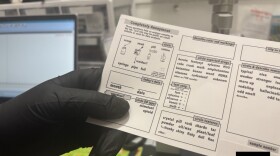A northern Michigan tribe along with local environmental organizations have scored a major victory in a water pollution case in Elk Rapids.
The lawsuit was first filed in 2023, after years of complaints about odor, foam and strange colors in Spencer Creek, which empties into Elk Lake.
The Grand Traverse Band of Ottawa and Chippewa Indians, The Watershed Center Grand Traverse Bay and Elk-Skegemog Lakes Association sued Burnette Foods, a fruit processor in Elk Rapids.
The plaintiffs argued that wastewater from washing fruit sprayed by the company onto nearby fields was exceeding its state-permitted limits, polluting groundwater, plus a wetland and creek that drain into Elk Lake.

They alleged Burnette Foods was breaking state environmental law, citing numerous permit violations from the Michigan Department for Environment, Great Lakes, and Energy. EGLE failed to address those violations, so the plaintiffs filed a citizen suit. The tribe and environmental groups also argued that Burnette was violating federal water law.
Burnette filed several motions to dismiss the lawsuit, all of which were denied.
On Wednesday, a federal judge wrote in an opinion and order that the “defendant has polluted and impaired groundwater beneath its spray fields and surface water connected to and downstream from its spray fields.”
“This is a very big deal,” said TJ Andrews, an attorney for The Watershed Center Grand Traverse Bay. “It restores my faith in these laws that have been around, on our books since I was born, literally the 1970s. These laws were written for precisely these situations, and they still work.”
The judge must still determine what Burnette needs to do differently, and the company could appeal that decision. Burnette’s attorneys said they could not comment on pending litigation.
“What we're asking for is that they stop discharging [wastewater] without a permit,” Andrews said. “They need either move it to new fields upland that are not draining into this wetland, into this creek … or they actually need to treat the water before they discharge it [onto the field].”
Andrews said the decision’s importance goes beyond Elk Rapids.
In 2023, the U.S. Supreme Court narrowed the definition of what counts as a wetland, curtailing which wetlands are subject to federal Clean Water Act regulations in a case called Sackett v. Environmental Protection Agency.
“The Sackett decision, redefining the definition of wetlands under the federal Clean Water Act, came out right when we brought our lawsuit,” she said. “There’s not a lot of case law interpreting Sackett.”
The judge in the Elk Rapids case determined that wetland did meet the definition of a wetland under those new rules.
At issue in the Elk Rapids case was another recent opinion from the U.S. Supreme Court in 2020, County of Maui v. Hawaii Wildlife Fund. The Maui decision honed in on what is considered “point source pollution” — the type of pollution that comes from a single identifiable source and requires a federal permit under the Clean Water Act.
That SCOTUS opinion determined that point source pollution which reaches U.S. waters even by filtering through groundwater does require a federal permit.
The plaintiffs in Elk Rapids argued that was the case for Burnette Foods spray fields — it is point source pollution filtering through groundwater and wetlands before reaching Elk Lake, and is therefore subject to federal clean water regulation. The judge agreed.
“It's going to have ripple effects beyond our little teeny-weeny creek and wetlands and Elk Lake,” Andrews said. “In the environmental litigation world, there's just not a lot of cases that get litigated all the way to the end, and where there's gray area, you do look at [other] cases. … This is going to add to a small body of case law interpreting Sackett in the country … and Maui potentially even more so.”







